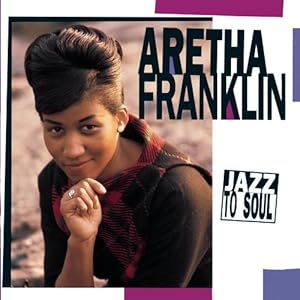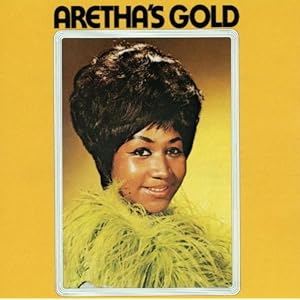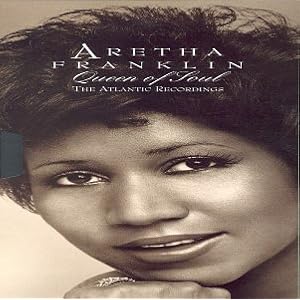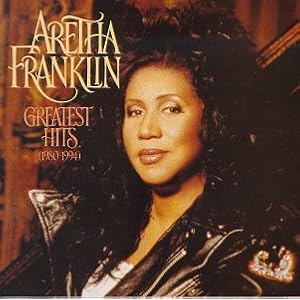 Hey Nineteen That's 'Retha Franklin
Hey Nineteen That's 'Retha FranklinShe don't remember The Queen of Soul
(From Hey Nineteen, by Steely Dan)
She was actually nineteen and I was playing Jump To It for her, and she actually had not heard of Aretha Franklin. I had bought the album on the strength of a ‘best of the month’ recommendation in Stereo Review, I tried hard to like it, and I played for my guest before I discarded it as the product of someone whose best days were long past. And Hey Nineteen was playing on the radio in those days…
She thinks I'm crazy
But I'm just growing old…
The only other Aretha album I had was Aretha’s Gold, and I’d gotten that from a used record sale at my local library, so it was a bit scratched up. Later I got my hands on Aretha’s Greatest Hits, from about ‘77, which tracked her progress from 1967 until Something He Can Feel in the mid 70s. There were only a few tracks that weren’t common to both albums.
In the end I got rid of Jump To It. Aside from the collection here I don’t have any Aretha Franklin albums in my collection. Not something I’m proud of, just a random fact. I grew up with all those great queen-of-soul hits, Respect, Chain Of Fools, Since You’ve Been Gone. But by 1970 she had almost disappeared from the radio – Rock Steady, Spanish Harlem, I remember those, Border Song once or twice, that’s about it.
And this collection: The Columbia recordings come from Aretha Franklin’s Greatest Hits, a vinyl LP, and a CD collection called Jazz To Soul which just happens not to include the one and only top 40 single she managed to have on Columbia. The Atlantic songs come mostly from a box set called Queen Of Soul, The Atlantic Years, and a few tracks come straight off of singles, or even off of the aforementioned Gold, and the Arista stuff is from an LP called Greatest Hits (1980 – 1994).
And the 19 year old? A story for another day…
No we can't dance together
We can't talk at all…
Aretha Franklin:
• Today I Sing The Blues – The vagaries of life, it’s good one day, crap the next. Aretha has trouble sounding sad, but she does her best amid the barroom piano and guitar obligato. This was her first chart single it seems, but that was on Cashbox; it didn’t make Billboard. From the winter of 1960 / 1961.
• Blue Holiday – Holidays are supposed to be fun. Is this a vacation? A Christmas-type holiday? Not clear. Either way, it’s not good. The Shirelles did this also.
• Just For A Thrill – There are no shortage of songs in Aretha’s canon about bad relationships, particularly those in which she gets beaten up, emotionally at least. She is involved, in this one, with a sadist. Listen to how she draws out the opening phrase, how her voice offsets the smoothness of the arrangement. Ray Charles did this also.
• If I Ever Would Leave You – A song about commitment, stated perversely by way of leave talk. The romantic sentiments here are highlighted by strings and chorus.
• God Bless The Child – Well here she is firmly ensconced in Billie Holiday territory. She acquits herself well, not surprisingly, but she still hasn’t found her voice.
• I’d Rather Drink Muddy Water – It’s all about not getting involved, resisting. And yet…
• This Could Be The Start Of Something – Always that moment of suspense. There are dozens of versions of this. Written by Steve Allen.
• Rock-A-Bye Your Baby To A Dixie Melody – Her first top 40 record, and her only one for
 Columbia, and yet the geniuses at Columbia / Sony couldn’t find room for it on Soul To Jazz, the Columbia years anthology. The song doesn’t fit her all that well. The best known versions are by Al Jolson and Judy Garland, and Jerry Lewis had a hit version in 1956. Yes, that Jerry Lewis. From the autumn of 1961.
Columbia, and yet the geniuses at Columbia / Sony couldn’t find room for it on Soul To Jazz, the Columbia years anthology. The song doesn’t fit her all that well. The best known versions are by Al Jolson and Judy Garland, and Jerry Lewis had a hit version in 1956. Yes, that Jerry Lewis. From the autumn of 1961.• Without The One You Love – More heartbreak. Not The Four Tops song.
• One Step Ahead – Here is Aretha going pop, aiming at the girl group market.
• Evil Gal Blues – The moral component to being who you are. Dinah Washington did this.
• Try A Little Tenderness – It was Otis Redding who won the soul sweepstakes with this; Three Dog Night more or less ripped off Otis and it was an early single for them. But Aretha does it as a heartbreaking slow dance, very different and moving. From the fall of 1962.
• Sweet Bitter Love – Like chocolate.
• Soulville – The closest she came to what she would do on Atlantic, though nobody would mistake this band with its cheesy organ for the muscle shoals rhythm section. From the winter of 1968, Columbia cashing in.
• Runnin’ Out Of Fools – A precursor to Chain Of Fools, and nothing highlights the difference between Aretha then and Aretha later. From the autumn of 1964.
• Trouble In Mind – A jazz / blues standard. She does a jaunty take on this.
• Walk On By – This isn’t the last time she’d go head to head with Dionne Warwick. In this case the arrangement is almost identical, the vocals are not as radically different as she’d make them later on, say, I Say A Little Prayer, or Brand New Me (Dusty Springfield) or Oh Me Oh My (Lulu)
• Mockingbird – Ree’s voice is a bit more accomplished than Inez Fox’s, but otherwise this is fairly close to the original Charles & Inez Fox hit version. Columbia put this out as a single in 1967 and it hit the top 100 towards the end of the year.
• Cry Like A Baby – Not The Box Tops song.
• Take It Like You Give It – A surprisingly rare topic in pop songs, not revenge as the title would suggest, but simply the imperfections that we have to put up with in any relationship. Sing it, Ree…
 • I Never Loved A Man (The Way That I Love You) – Aretha’s Atlantic debut was cataclysmic. Syncopated organ rhythm joined by bass then by Aretha’s voice, the song insinuates its way into your very being, and by the end, with her shouts of “never” while the Memphis horns are going full throttle, we totally in the grip of the conflict that she’s feeling over the abuse that she’s taking and the love that she’s feeling. And if this one record didn’t make John Hammond retire, it should have. From the spring of 1967, and the Queen of Soul began her reign…
• I Never Loved A Man (The Way That I Love You) – Aretha’s Atlantic debut was cataclysmic. Syncopated organ rhythm joined by bass then by Aretha’s voice, the song insinuates its way into your very being, and by the end, with her shouts of “never” while the Memphis horns are going full throttle, we totally in the grip of the conflict that she’s feeling over the abuse that she’s taking and the love that she’s feeling. And if this one record didn’t make John Hammond retire, it should have. From the spring of 1967, and the Queen of Soul began her reign…• Do Right Woman, Do Right Man – All about being faithful. This established Aretha not only as the Queen of Soul, but as the Queen of the Soul Ballad. This song took on a life of its own; it wasn’t a hit for Aretha (the B side of I Never Loved A Man if I’m not mistaken) but it was recorded by many, particularly those with a feeling for country – Gram Parsons did it with his first band (The International Submarine Band) and Ian Matthews did it on Journey From Gospel Oak.
• Respect – Written and originally recorded by Otis Redding as a plea for domestic recognition, Aretha’s version takes it beyond, to the personal, the racial, the political. And best of all, dance music doesn’t get better than this. A masterpiece. Number 1 during the summer of 1967, that magical summer…
• Baby, Baby, Baby – This ballad is a bit of a throwback to her Columbia days…
• Dr. Feelgood (Love Is A Serious Business) – I’d say so. A bit of after-hours blues, raw unbridled lust.
• (You Make Me Feel Like) A Natural Woman – Written by Carole King (who “covered” it later on Tapestry) and Gerry Goffin. Another number 1, this one a string-laden ballad, about an adult-style coming of age. Dave Marsh has his own theory of what this is about, but I don’t think we have to go there. From the autumn of 1967.
• Chain Of Fools – We get back here to Ree’s favourite subject – abuse. She can’t seem to break free; that’s the recurring theme. It’s odd, I think, how such emotionally difficult subject matter can make such incredibly great dance music, and this is indeed incredibly great dance music. The drummer alone deserves a Nobel Prize. Another masterpiece. Number 1 in the winter of 1968.
• Baby I Love You – The title is as generic as the music is not. This is a straightforward love song but the emotions are powerful, and the rhythm matches it heartbeat for heartbeat. From the fall of 1967.
• Since You’ve Been Gone (Sweet Sweet Baby) – She’s the bad guy in this song, and she begs her guy to come back, and she does so employing the musical equivalent of a full force gale. He can’t resist. From the winter of 1968.
• Think – Not the James Brown song. All the songs we hear are about feelings: love, jealousy, regret, heartache. Here she takes a different tack: “think” she says, about what you’re doing. Use your brains. Different. From the summer of ’68.
• Seesaw – The original by Don Covay, which I think I have somewhere. It can’t compare. From the winter of 1968 / 1969.
• The House That Jack Built – Not the Alan Price Set song. Love as an edifice. How much effort to we put into building our homes, our jobs, our surroundings, and what’s it worth when our lives disintegrate? Aretha hammers this home with her usual force, and that’s a good thing. From the fall of 1968.
• You Send Me – Aretha is one of the very few singers who could do Sam Cooke and do him justice. There’s a version of this song by Diana Ross & The Supremes, just think about that. This was the flip of Think and was a hit in the summer of 1968.
• I Say A Little Prayer For You – Here is where she goes head to head with Dionne Warwick. It was Dionne’s version that won out and hers is the one that people remember. Aretha, of course, is the more powerful, and some may say, more expressive, singer, but I’m not sure that this song calls for power. The record buying public wasn’t sure either; it sent this song to number 10, not bad, though it was the flip side of The House That Jack Built, which also has to be factored into the sale quotient. Dionne’s version went to number 4, almost a year earlier. This was from the fall of 1968. If anything is remarkable about this record, it’s how she lets the chorus handle the chorus, while she soars off on her own.
• I Can’t See Myself Leaving You – No, she can’t, and the whole question, stay or leave, becomes less of a question of judgment and more a matter of personal vision. From the spring of 1969.
• Why I Sing The Blues – She doesn’t, really, sing the blues. This song isn’t blues either, though one can imagine BB King doing it.
• The Weight – This surreal tale of rural America appeared on The Band’s first album, Music From Big Pink, in 1968, and that version, though it only reached number 63 at the time, has since attained legendary status. But it was Aretha’s version that most people heard first, her version that placed itself in the top 20, and her version that put soul into the song well before The Staple Singers got hold of it. From the winter of 1969.
• Share Your Love With Me – Tit for tat, The Band covered this on Moondog Matinee. Aretha’s version was a hit in the fall of 1969.
• Eleanor Rigby – The Beatles go gospel. Here is a version of Eleanor Rigby that you could actually dance to, better, I think, than Ray Charles similar but more dirge-like version. Ree’s version was a hit in the winter of 1969 / 1970.
• Son Of A Preacher Man – Having dealt with Dionne Warwick, Aretha now takes on Dusty Springfield’s soul aspirations at their core. Dusty’s version of this song is celebrated to this day; Aretha’s lies forgotten in the dust heap of top 100 trivia. We hear her doing here what she would begin to do with alarming frequency: she oversings. From the winter of 1970; the A side was the more successful Call Me, a hit in the spring.
• At The Dark End Of The Street – A “hit” for James Carr (whose version reached number 77), this tale of adultery was covered by everyone from Percy Sledge to The Flying Burrito Brothers. Aretha’s version is noteworthy for her heartbreaking cries of “hold me.”
• Let It Be – Like Ike & Tina, Aretha brings gospel to this Beatles chestnut, but unlike them, she leaves the lyrics alone.
• Spirit In The Dark – Well, if you’re gonna sing gospel then sing gospel. From the summer of 1970, not to be confused with Spirit In The Sky, by Norman Greenbaum, a much bigger contemporary hit.
• Don’t Play That Song (You Lied) – She replaces Ben E King’s melodrama with true soul grit. From the fall of 1970.
• Border Song – By Elton John. The original isn’t bad, neither is Aretha’s cover. From the winter of 1970 / 1971.
• A Brand New Me – She does Dusty again. From the summer of ’71, this was the B Side of Bridge Over Troubled Water.
• Singing A Song – A ballad in the old Columbia style. Come back to me….
• Drown In My Own Tears – A lot of crying that is. Believe it or not, for a song that made the rounds as much as this one did, the only hit version, such as it was, was by the Don Shirley Trio in 1962, and that version only made it to number 100. It’s best known by Ray Charles, and both Joe Cocker and David Clayton-Thomas, the latter fronting Blood, Sweat & Tears, had a crack at it.
 • Spanish Harlem – Ben E King’s debut hit reached number 10 in 1961; 10 years later Aretha reinvented the song and put it at number 2. From the fall of ’71.
• Spanish Harlem – Ben E King’s debut hit reached number 10 in 1961; 10 years later Aretha reinvented the song and put it at number 2. From the fall of ’71.• Rock Steady – A highlight of her early 70s output, very different though from the gutbucket soul she’d been doing only a few years earlier. Even so, it wasn’t a path she’d follow. From the fall of 1971.
• Oh Me Oh My (I’m A Fool For You Baby) – The bass on this is wonderful, the arrangement is beautiful, and Aretha overdoes it. I prefer Lulu. The B side of Rock Steady, and a hit in early 1972.
• Daydreaming – Now here’s one where she doesn’t have to worry about besting anyone, so she lets the electric piano create the dream-like ambience, and she sings it straight. And, presto, it works. From the spring of 1972.
• All The King’s Horses – What you’d expect. From the summer of 1972
• Bridge Over Troubled Water – She’s back to gospel here, and she takes Paul Simon along for the ride. From the summer of 1971.
• Angel – The spoken intro is just a bit over the top. A song, apparently, by her sister, just the usual stuff about wanting to meet Mr. Right. But an angel? From the summer of 1973. Not the Jimi Hendrix song.
• Master Of Eyes (The Deepness Of Your Eyes) – “Deepness?” Shouldn’t that be “depth?” Piccolo trills highlight the otherworldliness of this strange song. From the winter of 1973.
• I’m In Love – Here she takes on Wilson Pickett. Not easy pickins. From the spring of 1974.
• Ain’t Nothing Like The Real Thing – Originally by Marvin Gaye & Tammi Terrell, this salute to Coke, who at the time were using pop artists, Aretha included, to do their commercials, was a hit for Ree in the fall of 1974. By this time she’d settled into an MOR style with vocal overkill.
• Until You Come Back To Me (That’s What I’m Gonna Do) – She does a decent job with this Stevie Wonder penned whimsy, and it was a top 5 single in the winter of 1974.
• Without Love – She way oversings this. It is not the Clyde McPhatter song. From the winter of 74 / 75.
• Mr. D.J. (5 For The D.J.) – If this were a better song I could adopt it as my theme song. Now she does get into a funky groove here, perhaps in an attempt to recapture some of her queen-of-soul glory days. It might have worked had someone remembered to write a melody to this. From the fall of 1975.
• Look Into Your Heart – As MOR as she got yet. From the winter of 1977.
• Break It To Me Gently – Not the Brenda Lee song, at least not as far as I can tell. This is real thick MOR, with hysterical vocals. I may be wrong, but it seems to be trying to break into disco at the end… From the summer of ’77.
• Something He Can Feel – And what would that be, Aretha? Here is where she gets the 70s ballad thing right, though it goes on a bit too long. From the summer of 1976.
• Freeway Of Love – Welcome to the 80. Ree reinvents herself as a post-disco dance
 chanteuse, and she has taken on more than a passing resemblance to Tina Turner, at least on this song. This is from 1985
chanteuse, and she has taken on more than a passing resemblance to Tina Turner, at least on this song. This is from 1985• I Knew You Were Waiting (For Me) – This actually isn’t bad dance music, but Ree’s personality is pretty much obliterated. George Michael is on this. From 1987.
• Jump To It – Her first Arista single to make the top 40, from the fall of 1982.
• Willing To Forgive – The song tackles heavy subject matter, but not heavily. From 1993. Getting perilously close to the present…
• Doctor’s Orders – The old theme: the medical necessity of love. Think Good Lovin’ by The Young Rascals.
• United Together – A good 80s style slow dance, syrupy but serviceable. From 1980.
• Who’s Zoomin’ Who – Whatever that means. The title track of what was essentially her comeback album. From 1985.
• A Deeper Love – Love in the context of everyday life, to a groovy dance beat. From 1993.
• Honey – Not the Bobby Goldsboro song. A tepid love song, sickly. I'll take Bobby. From 1994.
• Get It Right – She doesn’t. From 1983.
• Another Night – Not The Hollies song. From 1986.
• Ever Changing Times – Domestic bliss (lyrics) or domestic stupor (music). Michael McDonald is on this. From 1992.
• Jimmy Lee – Billy Joel had Christie Lee, after all… From 1986.
• You Make Me Feel (Like A Natural Woman) – The parentheses are in the wrong place, but it’s how it was on the album cover. A live cover.
• I Dreamed A Dream – I’m not sure what the occasion was, but while her presence assuredly did it much honour, this song didn’t…


1 comment:
Way long post, dude.
Post a Comment